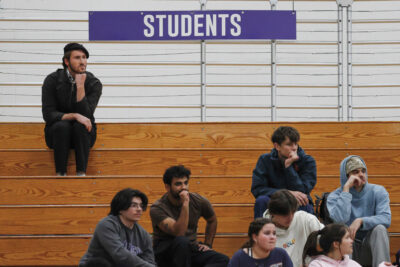Unsurprisingly to most people who know me, my upbringing was shaped by weird Mennonite humor. I mean, my family uses the word “worldly” ironically as a synonym for “risqué.” For example:
“Hey Mom, can we [insert activity involving loud music or exposed shoulders]?”“Hmm, Katie, that might be too worldly.”
Now, for many, that joke is about as funny as licking envelope flaps. It somehow amuses my family because my parents and grandparents are not that far removed from a time when this would have been a serious response. Their humor is a type of subversion, which I think defines Mennonite attitudes even more than passive aggression.
Some people grew up listening to their grandparents talk about walking to school uphill both ways. I got to hear my grandpa detailing the legendary Un-Mennonite Activity Committee (UMAC) that he was a part of at Hesston College, another haven of Menno learning wedged between a sorghum and wheat field in Kansas.
The UMAC took its name from the HUAC, a word that meant something to people in the 1950s other than the sound a fly-swatter makes.
HUAC, as history buffs out there know, stands for House Un-American Committee. In the era of Joe McCarthy, HUAC looked to rat out communists and “subversives” in the U.S.
I asked my grandpa recently if he had anything funny to say about being a member of UMAC back in the day. Humble Mennonite that he is, Grandpa Oesch suggested not talking to him first, but the founder of the committee, Leon Stutzman.
Always up for meeting Mennonite subversives, I called Leon to set up an interview.
Leon’s first un-Mennonite activities began at the high school of Eastern Mennonite College in Virginia back in the ‘50s. Leon says that while he and his friends joked about themselves being the Un-Mennonite Activities Committee, it was never “really a formalized thing.” They just liked to “go through the handbook and make sure we broke all the rules” because “what else was there to do?
Leon described rules that he and his friends found “unnecessary and ridiculous.” Pants for women were “unheard of.” Students, both girls and boys, always had to wear long sleeves to cover their elbows.
“I don’t know what’s so sexy about elbows,” he told me, “but we couldn’t expose our elbows.”
When these strict rules required boys to wear black ties, the UMAC kids pushed the limits by wearing navy blue ties instead, even to graduation. Leon said that if anyone noticed, they didn’t say anything.
When radios weren’t allowed for students, they built their own with crystals. These might not have even received any stations that anyone wanted to listen to, but “not being allowed radios was motivation to have one.”
Leon went on to Hesston with his UMAC philosophy, indoctrinating his new friends like Don Oesch, my future grandpa.
Leon showed me the “Epistles” they used to write: notebooks full of everything from “I’m studying math” to “It’s 10:15 and I farted in somebody’s room.”
Reading an excerpt written from Brother Oesch (as the UMAC piously referred to one another), Leon exclaimed, “This is really stupid stuff!”
After giving his “philosophy of hole,” which wasn’t very deep, Brother Oesch concluded with, “I was wondering if you boys had heard the story of two ants sitting on a toilet seat. It’s not very long. One got pissed off.”
I didn’t know my grandpa was such a worldly college kid.
Leon also shared how one day he was sitting in the library when my grandpa dared him to swallow a fly for a dollar, so he did.
Another time, the two of them spontaneously decided to hitchhike to Oklahoma. They ended up in Oklahoma City within a few hours and got some lunch.
It was harder to get back to Hesston, though, because Leon said, “We were about ready to lie in the middle of the road and pretend like we were hurt or something.”
They never got in trouble, and no one really noticed they were gone for the day.
I asked if there still wasn’t much to do in Hesston even back then.
Short answer: No. Even going to the movies in nearby Newton was considered an “un-Mennonite” thing to do.
And it didn’t seem to me that Leon would have given up his un-Mennonite activities for anything. He still has a stack of notebooks with ramblings on the philosophy of the hole.
At their 60th Hesston anniversary just year, the UMAC made a point to reunite again.
Leon, always keeping it real, hoped that even while college kids like me made friends here to last a lifetime, “it’s hard for you to sit here and think about talking about stuff you did when you were at Goshen College.”
So why not be a little subversive? Why wear black when you can wear navy blue?


